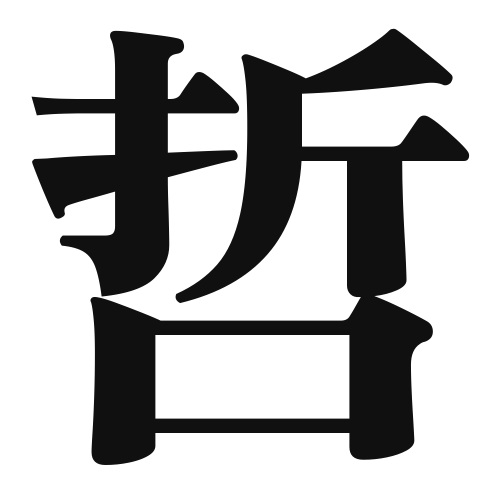1. Overview of Meaning
The kanji “哲” (tetsu) means “philosophy” or “wisdom.” It is often associated with deep thinking and understanding, particularly in the context of philosophical discussions.
2. Formation and Radical
Formation of the Kanji: The kanji “哲” is a phonetic-ideographic character (形声文字). It combines the meaning of wisdom with a phonetic component that suggests its pronunciation.
Radical: The radical for “哲” is “知” (chi), which means “to know” or “knowledge.” This radical emphasizes the connection between wisdom and knowledge.
3. Examples of Usage
Common Words and Phrases: Some frequently used words that include “哲” are:
- 哲学 (tetsugaku) – philosophy
- 哲人 (tetsujin) – philosopher
Example Sentences in Daily Conversation:
- 彼は哲学を学んでいる。 (Kare wa tetsugaku o manande iru.) – He is studying philosophy.
- その哲人の考え方は興味深い。 (Sono tetsujin no kangaekata wa kyōmi-bukai.) – The philosopher’s way of thinking is fascinating.
4. Synonyms and Antonyms
Similar Kanji: A kanji with a similar meaning is “知” (chi), which means “knowledge.” While “哲” emphasizes wisdom and philosophical thought, “知” focuses more on factual knowledge.
Antonyms: A kanji that represents the opposite meaning is “無知” (muchi), which means “ignorance.” This term highlights a lack of knowledge or understanding.
5. Cultural and Historical Background
Connection to Japanese Culture: The concept of “哲” is deeply rooted in Japanese culture, where philosophy and wisdom have been valued since ancient times. Influential philosophers like Confucius and Laozi have shaped Japanese thought.
Proverbs and Idioms: One common proverb is “知恵は力” (chie wa chikara), which translates to “Wisdom is power.” This reflects the cultural belief in the importance of wisdom in achieving success and understanding life.
